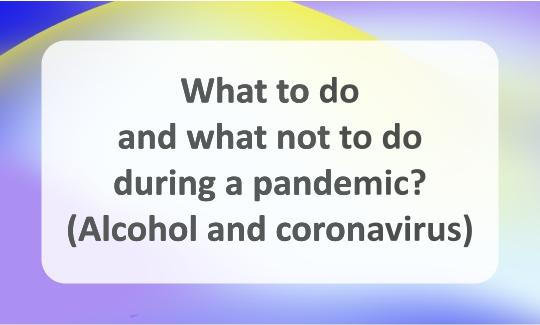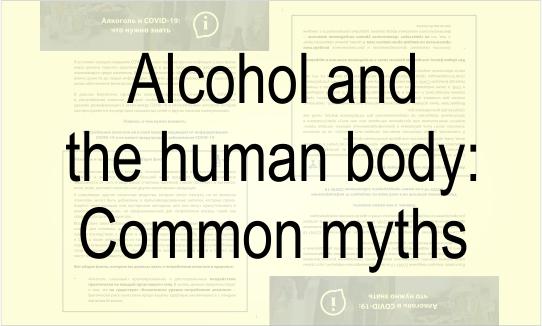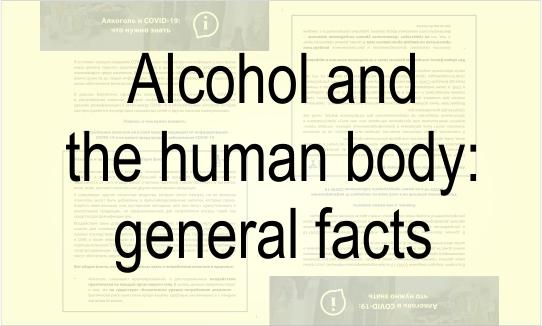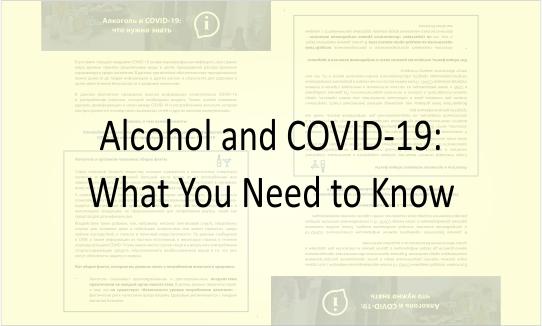Alcohol: Do's and Don'ts During a COVID-19 Pandemic

- To avoid weakening your body's immune system, harming your health, and creating health risks for others, you should completely avoid drinking alcoholic beverages.
- Only in a sober state can you maintain vigilance, speed of reaction and action, and clarity of mind when making decisions that affect you personally, your family members, and members of your environment.
- If you consume alcohol, reduce the amount to a minimum and avoid alcohol intoxication.
- Drinking alcohol should not become a social occasion for smoking in company and vice versa: drinking alcoholic beverages is often accompanied by smoking, and smoking in turn increases the risk of a more complicated and dangerous course of COVID-19. Don't forget that smoking indoors is a risk for other members of your family, and you must avoid creating an environment that endangers their health.
- Children and teenagers who live with you should not have access to alcohol. They should also not see you drinking, as your example is a role model for them.
- Talk to the children and adolescents who live with you about the problems associated with COVID-19 and alcohol use, such as the dangers of quarantine violations and physical distance requirements. Such violations can worsen the course of a pandemic.
- Be aware of how much time your children spend in front of the television or other devices. There is constant heavy advertising of alcoholic beverages in the media, and the media also disseminates harmful and incorrect or distorted information that can shape children and adolescents into drinking and excessive drinking habits at an early age.
- Never mix alcoholic beverages with medications, even herbal or over-the-counter medications, because mixing medications with alcohol can decrease their effectiveness or, conversely, increase their effects to the point of toxicity and danger to health and life.
- Do not drink alcohol if you are taking medications that affect the central nervous system (e.g., pain relievers, hypnotics, antidepressants, etc.) because drinking alcohol can inhibit liver function and cause liver failure and other serious health problems.
Read more
Common myths about alcohol and COVID-19 (Alcohol and Coronavirus)
Common myths about alcohol and COVID-19 Myth: Drinking alcohol kills the virus that causes COVID-19. Truth: Drinking alcohol does not kill the virus. Conversely, drinking alcohol can increase health risks if a person becomes infected with the virus. Alcohol (at a concentration of at least 60%) can be effectively used to disinfect the skin, but it does not have a disinfectant effect when ingested. Myth: Drinking strong alcoholic beverages destroys the virus particles in the air you breathe. Truth: Drinking alcohol does not help kill viral particles in the air you breathe, does not disinfect your mouth and throat, and is in no way a way to protect yourself from the virus. Myth: Drinking alcohol (in the form of beer, wine, distilled spirits, or herbal spirits) strengthens the immune system and increases the body's resistance to the virus. Truth: Drinking alcohol has a devastating effect on your immune system and does not strengthen your immune system or increase your…
Alcohol and the human body: general facts (Alcohol and coronavirus)
Alcohol and the human body: general facts Ethyl alcohol (ethanol) - a substance that is contained in alcoholic (alcoholic) drinks and is the cause of most of the harm from their use, regardless of which alcoholic beverages ethanol enters the body: wine, beer, spirits or other alcoholic products. Unfortunately, other toxic substances that may smell but are not ethanol can be added to adulterated drinks that are produced by illegal or artisanal methods; or they may be present in alcoholic products not intended for ingestion, such as hand sanitizers. Exposure to additives such as methanol (methyl alcohol) is fatal to humans even in small amounts or can lead to blindness and kidney failure, among other effects. According to media reports, as well as information from private sources…
Alcohol and coronavirus: what you need to know
Alcohol and COVID-19: What You Need to Know With the current COVID-19 (novel coronavirus infection) pandemic, all countries in the world must take decisive action to stop the spread of the coronavirus among the population. In these critical circumstances, it is critical to educate people about other health risks and hazards in order to ensure the safety and health of the public. This bulletin contains important information you need to know about COVID-19 and alcohol use. Also, special attention is paid to misinformation about the connection between COVID-19…


